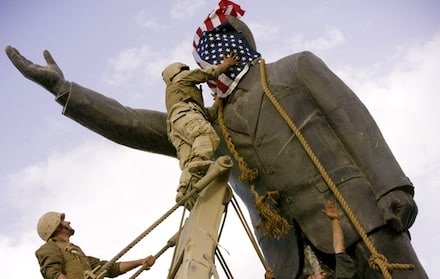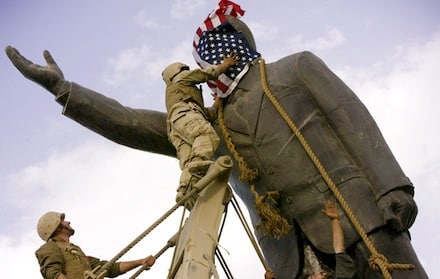
Iraq? On another Memorial Day, we’re still talking about Iraq?
Remembering
I attended the 2015 commencement ceremonies at Fordham University in New York. The otherwise typical ritual (future, global, passion, do what you love, you’ll never forget this place) began oddly, with an admonition to pause for a moment in honor of our troops in Iraq and Afghanistan, and a special congratulations to veterans among the graduating class. No other group was so singled out.
At William and Mary, a university that counts Thomas Jefferson as an alumnus, Condoleezza Rice was granted this spring an honorary degree in public service; William and Mary’s chancellor is former head of the CIA and former Secretary of Defense Robert Gates.
The ongoing news features “gaffs” by various Republican candidates about whether they would invade Iraq then knowing now, or maybe then invade now knowing then, or tomorrow knowing less. Pundits recycle the old arguments about imperfect decisions, mistakes being made, and a new trope, that Obama “lost” Iraq.
The mother of the first Navy Seal killed in Iraq wrote an open letter to Chairman of the Joint Chiefs of Staff Martin Dempsey. Dempsey responded to reports that Ramadi, Iraq fell to Islamic State by describing the city as “not symbolic in any way.” The mother asked a version of the familiar question, “so what did he die for?”
Remembering the Dead
Yes, it is another Memorial Day and we are still talking about Iraq.
The facts are in front of us. The Iraq War of 2003-2011 killed 4491 Americans. The Pentagon states 32,226 Americans were wounded “in action,” a number which does not include an estimated 200,000 soldiers who will suffer PTSD or major depression, or the 285,000 of them who experienced a probable traumatic brain injury.
On the Iraqi side of the equation, no one knows. Most of the Iraqis died more of the war — well-after then-president Bush declared “Mission Accomplished” and an end of major hostilities — than in the war per se. Estimates run from some 200,000 up to a million dead.
Argue with any of the numbers you like. Agree that the “real” numbers are big.
There are similar sets of numbers for Afghanistan, Libya, Yemen, Syria, Lebanon and many other places America makes war, overtly, covertly and via drone.
Lessons from Iraq
And that is why we should, on Memorial Day, still be talking about Iraq. We haven’t learned anything from our mistakes there and it is time we did.
The lessons of Iraq are not limited to bad decision making, falsifying intelligence reports, and exaggerated claims about smoking guns and mushroom clouds.
Those are just details, and they come and go with wars: the Gulf of Tonkin incident that brought America into the Vietnam War was false. So were the stories out of Gulf War 1.0 of Iraqi troops throwing Kuwaiti infants from their incubators. Same for the “we’re just on a humanitarian mission to save the Yazidi people” that reopened American involvement in Iraq less than a year ago. Just as false are the “we are invading ______ (fill in the blank with any number of locations) to liberate the people” there from a thug government, an evil dictator, another bad guy.
We’ve eliminated a lot of Qaddafis and Saddams, and you’d be hard pressed to find anyone on the ground in their old countries happy about what resulted from that. War after war we need to fight back against barbarians who seek to impose an evil philosophy across an entire region (Communism? Terrorism?) War after war we need to fight “over there” to prevent them from attacking us here.
Maybe as late as the Vietnam War we accepted it all. That was the way of it. You could call it patriotism, or you could call it naivety, or even faith. Most hadn’t yet realized our leaders would lie to us about things as important as war. There had been no Watergate, no fake WMDs. American Exceptionalism was not a right-wing trope twirled inside the confection of “Morning in America.” But we of the September 12 group of Americans have no excuse.
The lies and fudges and mistakes that took us to war in Iraq in 2003 were not unique; they were policy. There is a template for every American war since 1945, from novelties like the invasion of Grenada to the seemingly never-ending conflicts post-9/11. Unless and until we talk about that on some Memorial Day, we will be talking about Iraq, or wherever next year’s war is, on another Memorial Day.
Alone at Night
I think about that mom who wonders what her son died for in Ramadi. She is not alone; there are lots of moms whose sons died in Ramadi, and Fallujah, and Helmand Province, and Hue and Danang, even Grenada. Late at night, perhaps after a third glass of white wine failed again to let them sleep, those moms may try and console themselves thinking their sons and daughters died for “something.” I can’t criticize or begrudge them for that, they having lost a child. Ghosts are terrible things to follow you through life.
The kids who will serve in our military into the “commitment” to Afghanistan that extends into 2024 are currently in elementary school. They are out on the lawn right now this Memorial Day, playing at being ghosts.
What I would like to do on this Memorial Day is ask all the moms who have not yet lost a child in a war that does not matter to think about those unthinkable things while they are waving a flag, and while their kids are still alive.
If we think about that this Memorial Day, maybe we can start to learn the real lesson of Iraq.
Reprinted with permission from WeMeantWell.com.

